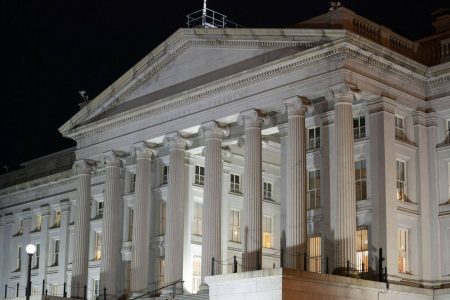
U.S. authorities blacklist Lebanese companies and individuals with ties to Hezbollah
The Trump administration’s blacklisting Wednesday of several Lebanese individuals and companies for allegedly helping Iran-backed Hezbollah highlights Washington’s strategy to counter a U.S.-designated terror group.
The Treasury Department blacklisted three officials and 11 entities linked to the Lebanon branch of the Martyrs Foundation, a group the U.S. designated in 2007 as supporting terrorism and officials say is used by Iran’s government as an instrument for its broader strategic aims.
The move is part of the Trump administration’s effort to pressure Iran and its proxies that are battling the U.S. and its allies across several fronts in the region, including in Syria and Iraq. Washington hopes to choke off the funding needed to finance those conflicts and to show that Hezbollah’s military wing—which is widely viewed internationally as a terror group—is integrated with the rest of Hezbollah’s structure, to deplete the group’s ability to threaten the U.S. and its allies.
The choice of targets offers insight into a critical front in the U.S. strategy to erode Hezbollah’s—and therefore Iran’s—influence in the region, as well as the risks that Washington’s pressure campaign represents to Lebanon’s economy.
Marshall Billingslea, the Treasury’s assistant secretary for terrorist financing, said the U.S. is determined to hold accountable “this terrorist group with so much American, French, Lebanese and other blood on its hands.”
“We will expunge them as a cancer for both the Lebanese political system and the Lebanese economy,” Mr. Billingslea said.
Representatives for Hezbollah and the Martyrs Foundation didn’t respond to requests for comment.
The Martyrs Foundation makes payments to families of killed or imprisoned Hezbollah fighters, and families of suicide bombers from Palestinian militant group Hamas and Palestinian Islamic Jihad, Treasury officials said.
One of the officials blacklisted Wednesday, Jawad Nur-al-Din, is the director general of the foundation’s Lebanon branch, allegedly oversees payments to the families of Hezbollah fighters killed or wounded in places such as Syria and Yemen and works closely with senior Hezbollah officials, according to the U.S. Treasury.
Atlas Holding and 10 subsidiaries were also targeted in the action, as well as its chief executive and chairman, Kassem Mohamad Ali Bazzi, and one of the company’s founders, Sheikh Yusuf Aasi.
Atlas didn’t respond to requests for comment.
Atlas, which owns or controls companies in the fuel, pharmaceutical, tourism and clothing sectors of Lebanon, is allegedly owned or controlled by the Martyrs Foundation and was identified as being subordinate to Hezbollah’s Executive Council as of 2017, the Treasury said.
The sanctions also targeted construction, medical and energy companies owned or run by Martyrs Foundation members, commercial activities that can help finance Hezbollah, U.S. analysts say.
The administration hopes the sanctions also will help marginalize Hezbollah’s economic and political influence in Lebanon through targeting officials, companies and banks associated with the group.
The action, administration officials say, puts others connected to the group on notice they are also at risk of penalties that can cripple a company and impair individuals’ ability to conduct business, travel and engage in politics.
U.S. officials said they expect the Special Investigation Commission, Lebanon’s counterterrorism financing unit, will be more aggressive in policing the country’s banking system against Hezbollah organizations and assets, even those that haven’t been identified by the U.S., Mr. Billingslea said.
“We are counting on the central bank, central bank governor and its enforcement arm to step up their game and to ensure that all of the assets associated…are frozen into perpetuity,” Mr. Billingslea said.
Source: WSJ





